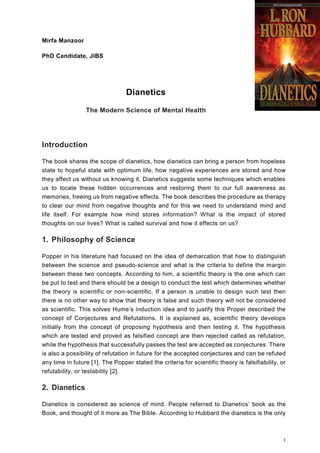Dianetics Fundamentals Explained
Dianetics Fundamentals Explained
Blog Article
How Dianetics can Save You Time, Stress, and Money.
Table of Contents6 Easy Facts About Dianetics ShownDianetics - Questions9 Easy Facts About Dianetics DescribedSee This Report about Dianetics
I could not ever not want to get anything that enters your mind for you- if it was otherwise, I would not be resting here with you, doing this. I not only can never have a problem, or otherwise intend to hear something that comes to mind for you, however I'm entirely excited to know every concept, every thought, every picture or sensation that arises or shows up for you- don't ever assume otherwise, and if somehow you do, please just let me recognize! Often, you may have a thought, and photo, concept or occurrence turn up that does not appear to address the question, or associate to it, but nonetheless, constantly do inform me about it, and as we proceed, the relevance will certainly arise for you.This is integral in the basis of processing, and the subject of this conversation: the basic functions of the counselor and the client: The fundamental role of the counselor is, as opposed to "typical training", not to control, which suggests to impose and/or hinder, however to rather work from the basis of EMPOWERING THE CLIENT.

Dianetics Fundamentals Explained
John Mcmasters expressed this basic reality wonderfully well in among his lectures on Power processing, wherein he explains just how he was asked what this "unique flair" was that he had for giving such excellent sessions; he had to think of that for a moment, and detected that it was what he had not been doing, in addition to what he was doing: he had not been reviewing, evaluating, computer, or as a matter of fact, generating any kind of thoughts, allow alone spoken expressions, after offering the command and while waiting on the computer to complete their response to their satisfaction; he was, simply and only, being present with the computer, and totally interested.
The function of the therapist, showed; that was his "unique flair". I have had my own experience which educated me this well, very beforehand in the video game. In 1982, having actually lately finished my training and teaching fellowship on New Age Dianetics, I was running this on a PC, and there was a factor in the session where (being a bit damp behind the ears not yet having numerous hours under my belt as an expert auditor) the PC appeared to be "taking too long" to express anything vocally after I offered him a command.
This secret transformed out to be one of the most important payment that John ever before made to the subject of therapy or auditing (Dianetics). In my modest viewpoint, it is the biggest payment that anyone has ever made to these subjectsthe application is entirely non-judgemental, non-evaluative, and lacking any kind of suggestion, advice or opinion.no preconceived program for individuals, or 'degrees' that they should do
In Scientology we prided ourselves on not examining for individuals. All that really her comment is here meant was that the auditor did not VERBALLY assess for the Computer in session.
6 Easy Facts About Dianetics Shown

Any person who had imp source actually ever before seen John audit can not aid yet see a special high quality in his bookkeeping."The client's basic function is to be there with the purpose of moving in the direction of their spiritual objectives, and to easily and completely reveal and experience whatever materializes for them in addressing the inquiries and implementing the guidelines in the handling.
This is something to process as needed. Yet additionally, individuals frequently have previous experience and/or brainwashing in auditing/processing which, somehow, and to some extent, actually misguides them into perspectives, concepts and actions patterns that avoid the complete understanding of these functions, and so they will tend to prevent the expressing of what comes to mind, as in the instances provided over. * The initial, and perhaps primary instances of mis-indoctrination resulting in much less than completely smooth and efficient sessions, can be located in specific elements of the training regimens, or "TR's":"TR's" are typically an individual's very first, or at least early, experience in Scientology, and while I will take place to discuss what I see as the flaws in principle and technique, nonetheless, have a tendency to be greatly healing, done as they are offered (Hubbard firmly insists that "TR's are not refining, they are educating", however factually, they are both processing AND training)
Alan Walter made comparable observations, and improved these with his "Presence Processes". There is no important source "flunking", and no rejection of the reality of this being handling. The focus, as it should be, gets on experiencing the other person's presence. All the manifestations which get a "fail" in doing "TR-0" are just the being's efforts to stand up to the other person's presence, and as opposed to being bugged and nagged with "Flunk", which enforces "failure!" on the being, one simply requires to be motivated to "stick their feet in the water a little much deeper", to progressively restore their ability and desire to completely share and experience "being right here", or "existence", with others.
Things about Dianetics

Report this page